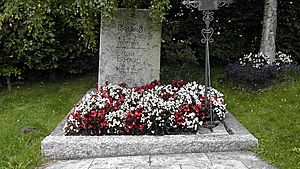Ludwig Erhard facts for kids
Quick facts for kids
Ludwig Erhard
|
|||||||||||||||||||||||
|---|---|---|---|---|---|---|---|---|---|---|---|---|---|---|---|---|---|---|---|---|---|---|---|
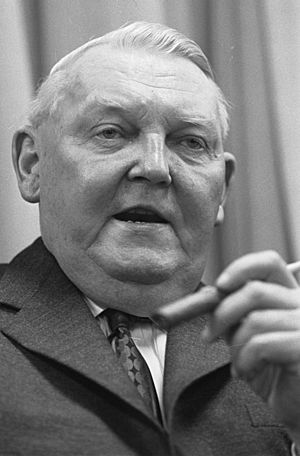
Erhard in 1964
|
|||||||||||||||||||||||
| Chancellor of Germany | |||||||||||||||||||||||
| In office 17 October 1963 – 30 November 1966 |
|||||||||||||||||||||||
| President | Heinrich Lübke | ||||||||||||||||||||||
| Vice-Chancellor | Erich Mende | ||||||||||||||||||||||
| Preceded by | Konrad Adenauer | ||||||||||||||||||||||
| Succeeded by | Kurt Georg Kiesinger | ||||||||||||||||||||||
| Leader of the Christian Democratic Union | |||||||||||||||||||||||
| In office 23 March 1966 – 23 May 1967 |
|||||||||||||||||||||||
| Bundestag Leader | Rainer Barzel | ||||||||||||||||||||||
| Preceded by | Konrad Adenauer | ||||||||||||||||||||||
| Succeeded by | Kurt Georg Kiesinger | ||||||||||||||||||||||
| Vice-Chancellor of Germany | |||||||||||||||||||||||
| In office 29 October 1957 – 15 October 1963 |
|||||||||||||||||||||||
| Chancellor | Konrad Adenauer | ||||||||||||||||||||||
| Preceded by | Franz Blücher | ||||||||||||||||||||||
| Succeeded by | Erich Mende | ||||||||||||||||||||||
| Minister for Economics | |||||||||||||||||||||||
| In office 20 September 1949 – 15 October 1963 |
|||||||||||||||||||||||
| Chancellor | Konrad Adenauer | ||||||||||||||||||||||
| Preceded by | Position established | ||||||||||||||||||||||
| Succeeded by | Kurt Schmücker | ||||||||||||||||||||||
|
|||||||||||||||||||||||
| Personal details | |||||||||||||||||||||||
| Born |
Ludwig Wilhelm Erhard
4 February 1897 Fürth, Kingdom of Bavaria, German Empire |
||||||||||||||||||||||
| Died | 5 May 1977 (aged 80) Bonn, West Germany |
||||||||||||||||||||||
| Resting place | Gmund am Tegernsee | ||||||||||||||||||||||
| Political party | Christian Democratic Union | ||||||||||||||||||||||
| Spouses |
Luise Schuster
(m. 1923; died 1975) |
||||||||||||||||||||||
| Children | 1 | ||||||||||||||||||||||
| Alma mater | Goethe University Frankfurt (Ph.D.) | ||||||||||||||||||||||
| Signature |  |
||||||||||||||||||||||
| Military service | |||||||||||||||||||||||
| Allegiance | |||||||||||||||||||||||
| Branch/service | |||||||||||||||||||||||
| Years of service | 1916–1919 | ||||||||||||||||||||||
| Rank | Unteroffizier | ||||||||||||||||||||||
| Unit | 22nd Royal Bavarian Field Artillery Regiment | ||||||||||||||||||||||
| Battles/wars | World War I
|
||||||||||||||||||||||
Ludwig Wilhelm Erhard (born February 4, 1897 – died May 5, 1977) was an important German politician. He was a member of the Christian Democratic Union (CDU) party. From 1963 to 1966, he served as the Chancellor of West Germany.
Erhard is famous for helping West Germany's economy recover after World War II. This recovery was so fast and strong that people called it the "Wirtschaftswunder" (economic miracle). He was the Minister of Economic Affairs from 1949 to 1963 under Chancellor Konrad Adenauer. During this time, he promoted the idea of a "social market economy". This economic approach is still important in Germany today.
However, when Erhard became Chancellor, he faced challenges. He didn't have strong support from Adenauer, who remained a powerful figure. He also struggled with a budget deficit and foreign policy issues. His popularity decreased, and he resigned as Chancellor in November 1966.
Contents
Early Life and Education
Ludwig Erhard was born in Fürth, a town in Bavaria, on February 4, 1897. His father, Wilhelm Erhard, owned a clothing store. Ludwig had two brothers and a sister. When he was three years old, he had infantile paralysis. This caused his right foot to be deformed, and he had to wear special shoes his whole life.
He started primary school in Fürth in 1903. His grades were not very good at first. In 1907, he went to a vocational high school and finished in 1913. After school, he worked as an apprentice at a textile company. Then he worked as a salesman in his father's shop.
Military Service and University Studies
In 1916, during World War I, Erhard joined the German military. He trained to aim guns in the artillery. He served on the Western Front and later on the Eastern Front in Romania. He got sick with typhus and was sent back home.
He returned to his unit but was badly wounded in 1918 during a battle. He spent many months in a military hospital. His left arm became permanently shorter than his right. Because of his injury, he could no longer work in his father's shop.
In late 1919, Erhard began studying economics at a business college in Nuremberg. He earned a degree in business administration in 1922. He became friends with Professor Wilhelm Rieger, who influenced his ideas about economic freedom. Thanks to Rieger, Erhard went to the University of Frankfurt in 1922. He earned his Ph.D. in 1925. His ideas were also shaped by his professor, Franz Oppenheimer, who was against monopolies. In 1923, he married Luise Schuster, who was also an economist.
Early Career and Post-War Efforts
After finishing his studies, Erhard worked for his father's company for a short time. In 1928, he became a research assistant at an economic research institute. Later, he became the deputy director.
During World War II, Erhard secretly worked on plans for Germany's economy after the war. The Nazis had forbidden such studies. He wrote a paper in 1944 about how Germany could deal with its finances and debts after losing the war. He shared his ideas with people who were part of the German resistance to Nazism. Erhard was against Nazism and wanted to help Germany's economy recover after the war.
After the war, Erhard became an economic advisor. In 1947, he led a special group that prepared for a new currency in West Germany. This new currency, the Deutsche Mark, was introduced on June 20, 1948. Erhard then took a bold step: he removed many price controls and production rules that the military government had put in place. This helped set the stage for Germany's economic recovery.
Minister of Economic Affairs
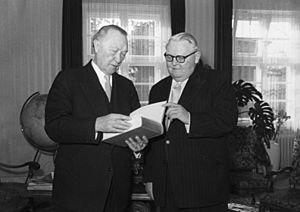
In 1949, Germany held its first free elections after the Nazi era. Erhard was elected to the Bundestag (German parliament). He was then appointed Federal Minister for Economic Affairs. He held this important job for 14 years. From 1957 to 1963, he also served as the Vice-Chancellor.
Erhard strongly believed in economic freedom. He joined a group called the Mont Pelerin Society in 1950. This group was made up of thinkers who believed in liberal economic ideas. Erhard used this group to test his ideas for rebuilding the West German economy. Some members of the group were also part of the Allied High Commission, which helped Erhard share his ideas directly with them.
Erhard's economic policies were very popular. The German economy experienced a "miracle recovery" in the 1950s. It grew quickly, and many people became prosperous. This helped Germany overcome the destruction of the war and welcome millions of refugees from the east.
Becoming Chancellor
After Chancellor Adenauer resigned in 1963, Ludwig Erhard was elected as the new Chancellor on October 16. He was re-elected in 1965. From 1966 to 1967, he also led the Christian Democratic Union party. It was later discovered that he was never officially a member of the party, but everyone treated him as if he was.
During his time as Chancellor, some important social reforms were made. For example, a housing benefit was introduced in 1965 to help people with their rent.
Foreign Policy Challenges
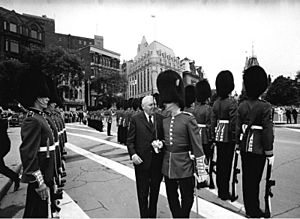
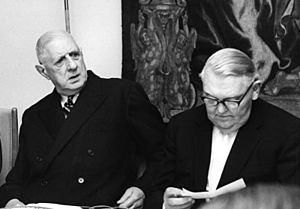
Erhard had a big idea for reuniting Germany. He thought West Germany could offer a huge amount of money to the Soviet Union. In return, the Soviets would allow more freedom in East Germany and eventually German reunification. He believed this "loan" of $25 billion US dollars could help solve the problem of a divided Germany. However, the Soviet leader, Nikita Khrushchev, lost power in 1964, and the plan never moved forward. Also, the Soviet Union got other loans, so they didn't need Erhard's money anymore.
Erhard's support for the American role in the Vietnam War also caused problems. He wanted closer ties with the United States and less with France. This made it harder to work on German unification, as the U.S. was focused on Southeast Asia. Erhard didn't fully realize that American global interests were guiding their policies. He also moved away from Adenauer's approach of having good relations with both the U.S. and France.
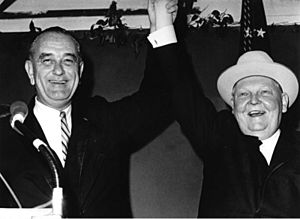
In December 1963, Erhard visited U.S. President Lyndon B. Johnson. Johnson even hosted a special barbecue for Erhard in Texas. This showed the close ties between the two leaders.
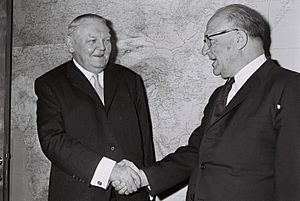
However, Erhard faced a serious budget problem in 1966. This, along with other issues, led to his resignation. His fall from power suggested that Germany needed a different approach to foreign policy. Later, Chancellor Willy Brandt developed a new policy called Ostpolitik. This aimed to improve relations with the Soviet Union and Eastern Europe.
Resignation and Later Life
On October 26, 1966, a minister from the FDP resigned because of the new budget. Other FDP ministers followed, and the government coalition broke apart. On November 30, 1966, Erhard resigned as Chancellor. His successor was Kurt Georg Kiesinger, who formed a new government.
Ludwig Erhard continued to be a member of the West German parliament until he passed away. He died in Bonn on May 5, 1977, from heart failure. He was buried in Gmund, near the Tegernsee lake. Several professional colleges in Germany are named in his honor.
Images for kids
See also
 In Spanish: Ludwig Erhard para niños
In Spanish: Ludwig Erhard para niños
 | Janet Taylor Pickett |
 | Synthia Saint James |
 | Howardena Pindell |
 | Faith Ringgold |


